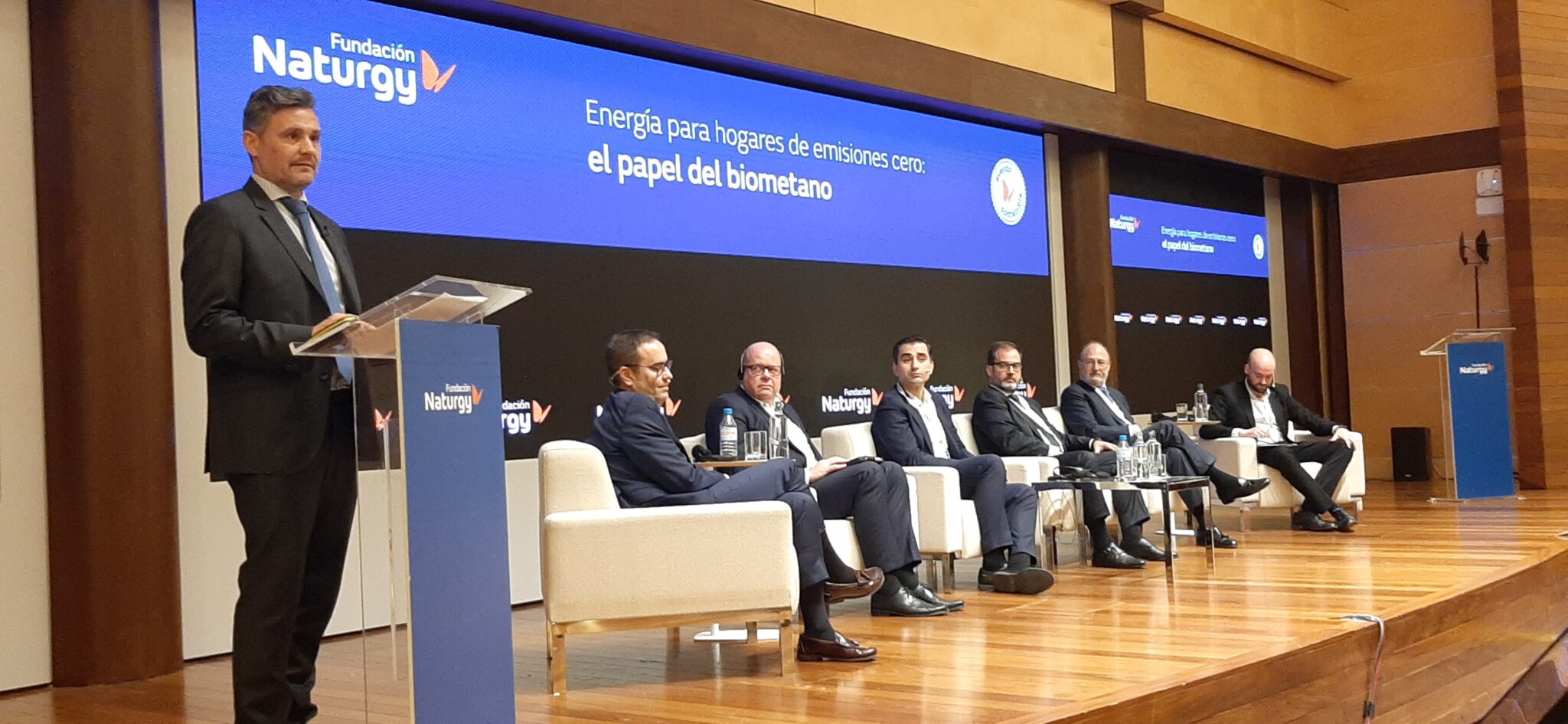Experts underline biomethane’s key role in decarbonising residential consumption and call for support for its deployment
Despite its enormous potential, Spain lags considerably behind other European countries such as France and Denmark in the production and consumption of this renewable gas.

Renewable gas is set to play a central role in Spain’s energy transition and has great potential to drive a sustainable and efficient decarbonisation of residential consumption. The best example is biomethane, which has similar qualities to natural gas and can be used in condensing boilers in homes to help reduce emissions from energy consumption linked, for example, to heating. In order to address the present and future of this renewable gas in the residential sector, the Naturgy Foundation has organised the conference ‘Energy for zero-emission homes: the role of biomethane’.
The meeting provided an opportunity for representatives from a wide range of economic sectors to give their views on the role that renewable gas should play in decarbonisation. The opportunity is enormous, according to Óscar Barrero, PwC’s lead partner for the Energy sector. “Spain has the potential to produce 163 TWh of biomethane annually, throughout the country. This figure is eight times higher than the target set by the Integrated National Energy and Climate Plan”. This expert gave the opposite example of France, a country with similar characteristics to Spain, but where the deployment of biomethane is well ahead. “France’s target is 50 TWh and the country is putting almost 100 plants into operation per year thanks to a very strong support model for its agricultural and livestock sector,” he said.
Another example of a European country with a much higher development in biomethane production and consumption is Denmark. “Here we have approximately 60 plants of varying capacity and the government has accelerated the plan to meet the ambitious 2040 targets as early as 2030,” explained Danish Torben Brabo, senior VP of Energinet. “Biomethane is safe and green, two sides of the same coin. Our current production is 10 TWh and we are now working on producing even more, covering 100% of demand by 2030, and exporting,” he said.
Luis del Barrio, Energy Practice Partner (EN&UTL) at Arthur D Little (ADL), explained the conclusions of the study “Decarbonisation of household heat demand: levers to accelerate the process”. In this report, ADL concludes that “the heat pump in certain areas and operating conditions and for certain population groups is not the most efficient solution and other high efficiency alternatives and/or the use of renewable fuels should be considered”. “Solutions based on the new gas boilers are presented as simple and efficient, and the increased use of renewable gases will increase this efficiency in the long term,” he added.
According to the report, the complete changeover to a heat pump installation that meets renewable criteria can cost between 10,000 and 20,000 euros (50% of the average annual income of a Spanish household), and requires leaving the home for between 12 and 16 days for the installation, as well as increasing the power to be contracted (between 1.5-4.5kW additional) throughout the year. More than 66% of homes in Spain are in buildings, which limits the use of the heat pump given the space available, the regulations of the building or the owners’ associations, and the proximity of the equipment to each other in the courtyards, which could affect its performance.
Nicolás Klingenberg, president of the Association of Manufacturers of Heat Generators and Emitters (Fegeca), has spoken along the same lines. “We estimate that 70% of households could not install a heat pump in their homes due to lack of space, so boilers are an efficient way to decarbonise. You cannot confuse the combustion technology with what gas is being used, and in the case of boilers we have an advantage because the use of biomethane throughout the park is susceptible,” he remarked.
Renewable gas has also made a strong entry into the real estate sector and several developers are already working with Nedgia, the gas distributor of the Naturgy Group, to introduce its supply in new buildings. One of them is Aedas Homes. “The big trojan horse we are left with now is CO2 emissions. The issue of efficiency is overcoming and we have to focus on emissions. There are existing technologies and what needs to be looked at is the fuel to be used. There will be a transition in which biomethane will be fundamental,” said Diego Demaría López, Sustainability Director at AEDAS Homes.
Finally, Raúl Suárez, CEO of Nedgia, concluded the day by highlighting the fundamental role that gas has to play in decarbonisation and underlining the commitment of Naturgy and the energy sector to reducing emissions. In this sense, he pointed out that the role of biomethane will be key in the decarbonisation of residential consumption and called for the consumer to be part of the process because any decarbonisation solution that is proposed must be economically and socially sustainable.
“Spain needs and can have much more ambition and momentum on renewables, but we are still falling far short of our potential. Biomethane is the great opportunity for Spain to take advantage of in terms of renewable energy and is the most sustainable way to achieve residential decarbonisation,” he concluded.
Share